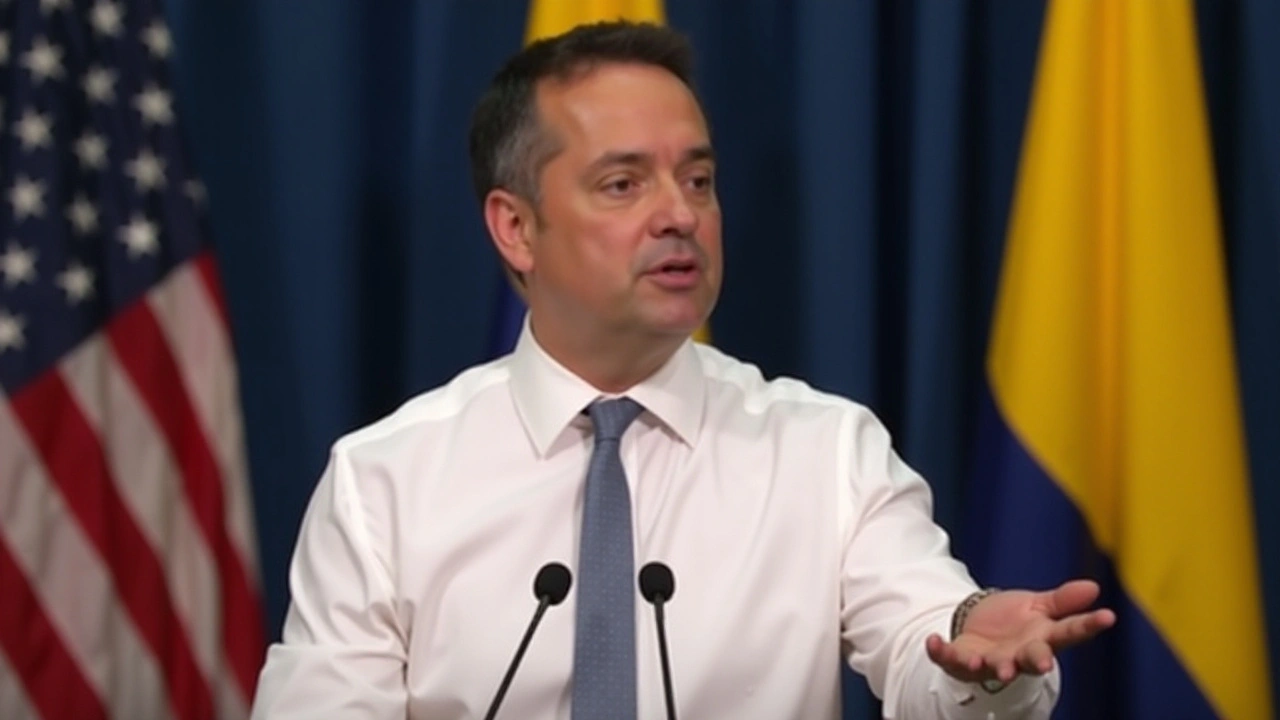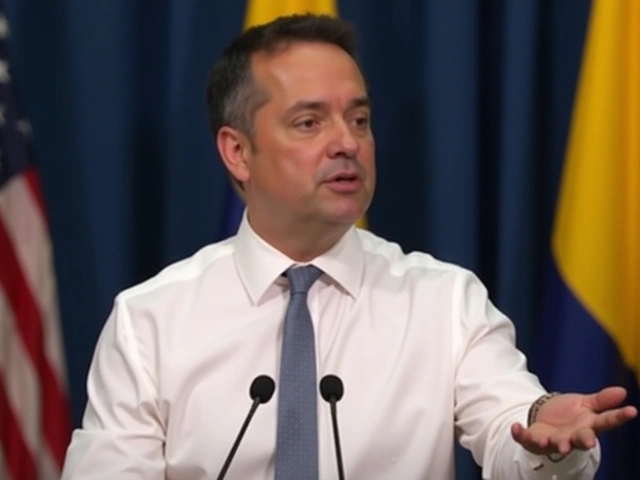Tensions Rise Over Deportation Flights
In a recent dramatic development, Colombia and the United States narrowly escaped the brink of a trade war through last-minute negotiations. The crisis surfaced when Colombian President Gustavo Petro took a firm stand against receiving deportees via US military flights, insisting on 'dignified conditions' for those returned to Colombian soil. This move was seen as a bold pushback against Washington's methods, igniting a considerable diplomatic conflict between the two nations.
President Petro's refusal came on the heels of two military flights he turned away, a decision that baffled many and incited an immediate response from US President Donald Trump. President Trump retaliated by announcing severe measures, including a steep 25% tariff on Colombian imports, with a staunch warning to increase these to 50% if the situation was not amicably resolved within a week. Such measures extended beyond tariffs, encompassing potential visa restrictions and financial sanctions aimed at pressuring Colombia into compliance.
An Intense Negotiation Period
The prospect of hefty tariffs threatened Colombia’s economy, urging prompt diplomatic engagement. Both countries rushed into negotiations, striving to cool down the escalation before reaching the climax of economic repercussions. During these talks, President Petro's insistence on maintaining respect and dignity for deportees was pivotal. Meanwhile, the United States remained firm on its stance, trying to balance domestic pressures with international diplomacy.
The resolution struck involved resuming deportation processes under terms that seemed to reflect Petro's demands. While the White House portrayed this agreement as a victory of acceptance on Petro's part of all US terms, Colombia's narrative spoke of assurances gained about the humane treatment for those being deported. The finer details of the accord reportedly included a return to civilian aircraft utilization for these flights, stepping away from military might as a tool of deportation.
Complexities of US-Latin America Relations
This incident underscores the intricate web of US-Latin American relations and ongoing immigration policy challenges. Historically, Colombia has been a staunch ally in the region for the United States, standing as a line of defense in diplomatic relations. Deportation flights have been frequent, with Colombia accommodating hundreds of such flights, facilitating the return of nationals under often contentious circumstances.
The particular use of military aircraft added a layer of contention that was evidently a red line for Petro's administration, who was unwilling to capitulate without assurances of dignity. This crisis, and the intense negotiation thereto, highlights the fragility of international cooperation in immigration matters, where sovereignty and human rights often stand at odds with economic and political exigencies.
Trump's 'Threat-Forward' Approach Tested
Observers see this diplomatic skirmish as another chapter in Trump's 'threat-forward' tactic, particularly in dealings with Latin America. This approach is noted for its reliance on economic leverage to exert international influence. For countries like Colombia, navigating these waters involves a delicate balancing act of cooperating with US immigration objectives while ensuring their national concerns and principles are not undermined.
This is part of a broader US strategy that also involves deportations to countries like Mexico and Guatemala. Millions face the throes of potential deportation across borders, including some individuals residing as legal yet temporary residents, presenting a complex challenge for international relations and human rights advocates alike.
Business Community and Citizens Advocate for Diplomacy
The diplomatic resolution with the trade war on the horizon has been met with relief and approval from both the business sector and Colombians at large, those who sought de-escalation through diplomacy. The specter of tariffs had loomed alarmingly, threatening significant economic ramifications for Colombian trade, notably concerning coffee, flowers, and tropical fruit exports crucial to its economy.
In the aftermath, the applauding echo from citizens and businesses alike underscores Colombia's continued focus on effective, respectful international relations and maintaining strong ties with its heavily influential northern neighbor. The avoidance of a full-blown trade skirmish adds to an ongoing dialogue about how America interacts with its Latin American counterparts, particularly around the deeply personal and complex issue of immigration.
This incident will undoubtedly resonate in diplomatic circles, serving as a wake-up call regarding how Latin America is approached concerning immigration. The ability to address these acute issues diplomatically suggests a possible framework for future conflicts, where human dignity, economic stability, and international cooperation are weighed in equal measure.




Comments
Interesting how quickly both sides shifted gears when the stakes hit the coffee and flower markets. It's a reminder that economic pressure can sometimes open doors for diplomatic compromise. Glad to see a peaceful resolution, though the human side of deportations still needs attention.
Yo, this whole drama feels like a blockbuster thriller! Petro threw a curveball and Trump swung back with a 25% tariff-totally wild, man. The world was on edge, and then bam, they hashed out a deal at the last second. Definately a case of politics making headlines.
The fallout could've hit coffee exports hard.
Let’s be clear: the United States can’t keep flexing its economic muscle on sovereign nations without consequences. When you threaten a partner's key industries, you’re basically holding their future hostage. It’s a reckless game that undermines the very notion of mutual respect. Latin America deserves better than to be bullied into compliance.
Ah, but you see, the narrative is far more nuanced, isn’t it?; the US, in its pursuit of border security, merely utilizes the tools at its disposal-; and while some may label it as bullying, others might argue it’s a calculated move,; one that balances national interest with regional dynamics.
The late‑night pact between Bogotá and Washington reads like a paradox, where power and principle dance on a thin line.
The United States wielded tariffs as a lever, reminding Colombia of the cost of dissent.
Petro’s insistence on “dignified conditions” for deportees introduced a moral counterweight to the bargain.
This tug‑of‑war between economics and ethics is not new, yet each iteration feels fresh in its human impact.
When a coffee farmer wonders whether his beans will reach the market, the abstract notion of “human dignity” suddenly becomes tangible.
Likewise, a family awaiting the return of a loved one overseas feels the weight of policy decisions that are made far above their heads.
The choice to shift from military aircraft to civilian planes may seem technical, but it signals a shift in how states perceive the humanity of those they repatriate.
Diplomacy, in this case, acted as a pressure valve, releasing the heat before it could explode into a full‑blown trade war.
Yet the relief is fleeting if the underlying tensions remain unaddressed, for tariffs are merely the tip of an iceberg of resentment.
History teaches us that repeated cycles of threat‑and‑concession erode trust faster than any single sanction could.
Moreover, the spectacle of President Trump’s “threat‑forward” rhetoric fed into a broader narrative of American exceptionalism turned mercantilist.
In contrast, Petro’s stance, though framed in nationalist tones, invoked a universal call for humane treatment-a call that resonates beyond borders.
The interplay between these leaders showcases how personal politics can shape the fate of commodities that sustain a nation’s economy.
It also raises the question: can trade agreements ever truly honor the dignity of individuals caught in their crossfire?
Perhaps the answer lies in more transparent mechanisms, where civil societies from both sides monitor the implementation of such accords.
Until then, the world watches, hoping that this uneasy truce becomes a stepping stone toward a more compassionate and balanced international order.
That’s a solid point, and it shows how even simple talks can lead to big changes. It’s nice to see people caring about both trade and people’s rights. Keep pushing for clear rules and empathy.
Nice vibe 😊 simple but deep
Yo, stepping back, it's like a chess game where the pawns are people’s lives. The board’s made of coffee beans and politics, and every move echoes in the streets.
Statistically, imposing a 25% tariff on a single export reduces the trade volume by approximately 12%, assuming price elasticity remains constant. This also triggers secondary effects across supply chains, lowering GDP projections by 0.3% in the short term. The data suggests that such coercive measures are inefficient for long‑term stability.
Let’s remember that every policy ripple affects real families, so fostering dialogue is key. Encourage open conversations and keep the focus on humane solutions.